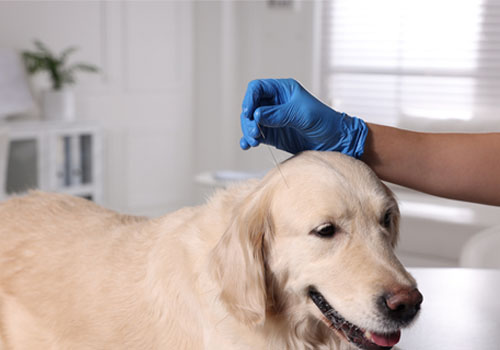Dog Acupuncture is the practice of inserting fine, solid needles into the body to assist in pain relief.
It is believed to function by inhibiting pain signals in the neurological system and promoting the production of more endogenous painkillers by the brain and central nervous system. It is applied in conjunction with other modalities to treat painful ailments. Although stimulating nerves, acupuncture needles do not result in unpleasant pain sensations. Animals may occasionally react to this feeling as though they are expecting pain, but when it does not materialise, they relax.
Throughout the procedure, they frequently grow calm and drowsy and typically accept the tiny needles rather well. When they return to the practise, they frequently seem eager about the upcoming therapy.
The majority of patients respond very well to this non-invasive, sedation-free procedure that is performed in the consultation room.

The therapist will go over treatment plans with you; they may differ based on the problem we are trying to solve. Depending on your dog's condition and response, we will determine after four weeks whether acupuncture is helping. If so, we will devise a plan that typically entails tapering off the therapy to prolong the desired outcome.
When administered properly, dog acupuncture is quite safe. A veterinary acupuncturist can provide you with advice as there are very few situations in which acupuncture is not appropriate.
Call us on 01235 538721 to enquire
Acupuncture for dogs
Dog acupuncture may be recommended for your dog for a variety of reasons, the most common being pain. This typically refers to discomfort from arthritis and stresses in the muscles brought on by disc disease and abnormalities in the bony spine. There may be responses to other types of pain.
Following the inspection, several bodily areas will have needles inserted and repeatedly manipulated or stimulated. Unlike medication, there is no predetermined "dose" for acupuncture; instead, your veterinarian will determine the appropriate amount depending on your dog's reaction both during and after the treatment. They can experience relaxation and drowsiness during the procedure.
Dogs often return home and sleep for extended periods of time with great sound. This indicates that your dog will benefit greatly from acupuncture and is a positive indicator. If they don't seem asleep, it doesn't imply they won't respond, so don't worry. Though this is also a positive sign, your dog might act a little more ecstatic than usual at times. Try to keep them quiet the rest of the day to avoid them going overboard.
If not, continue treating your dog as usual following acupuncture. Make any dietary, pharmaceutical, or exercise changes only after consulting your veterinarian.
Three Possible Reactions to Acupuncture Treatment:
- TThey could appear more uncomfortable or inflexible. They will get better once again and ought to be better than they were a day or two later. But you have to let your veterinarian know so they can modify the medication for the next time.
- It's possible that you won't get any response. This is always disheartening, but it does not imply that your dog will not improve; rather, it could just suggest that they will require a little more time or that the initial treatment's progress was too slight or short for you to notice. It is impossible to predict if they won't react till following the fourth therapy. Not every human or animal is a "responder" to acupuncture.
- There might be an improvement. In the three days following therapy, this could happen at any time. It's possible that the symptoms we're trying to address will reappear before the next session, but that's okay. The benefits will last longer with each consecutive treatment, possibly eliminating the need for additional treatments for your dog for a while.





